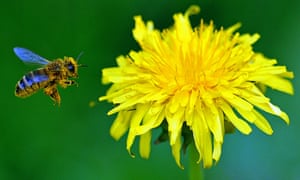Help bees by not mowing dandelions, gardeners told. Plants provide key food source for pollinators as they come out of hibernation
 | ||||||
| Each dandelion head has up to 100 individual flowers. Photograph: Janek Skarzynski/AFP/Getty Images |
Gardeners should avoid mowing over dandelions on their lawn if they want to help bees, according to the new president of the British Ecological Society.
Dandelions – which will start flowering in the UK this month – provide a valuable food source for early pollinators coming out of hibernation, including solitary bees, honey bees and hoverflies.
Each dandelion head contains up to 100 individual flowers, known as florets, which contain nectar and pollen. There are 240 species of dandelion in the UK.
Prof Jane Memmott said: “If dandelions were rare, people would be fighting over them. Because they’re common, people pull them out and spray them off and all sorts of horrible things. Just let them flower.”
Memmott, who took over as president of the BES at the start of this year, is also a professor of ecology at the University of Bristol.
She said gardeners should avoid planting too many “pompom shaped” flowers, such as old English roses and dahlia, because they focus so much of their energy on producing petals and have very little nectar and pollen. “As a rule, if you can see the pollen and nectar parts of a flower without pulling back petals, then it’s OK for pollinators,” she said.
Carrots that have flowered, or “bolted”, and onions in unkempt vegetable gardens are also some of the best plants for pollinators.
“People are a lot tidier than they used to be. This whole business of keeping your lawn clipped and pulling the weeds out is part of some British obsession with tidiness,” Memmott said. “If you look back at old pictures, people weren’t as tidy. I think bohemian untidiness is what we’re aiming for – you don’t want it to look like neglect.”
Leaving the grass to grow 8-10cm (3-4in) tall means clovers, daisies, self-heal and creeping buttercup can also flower. “You can’t personally help tigers, whales and elephants but you really can do something for the insects, birds and plants that are local to you,” said Memmott, who encouraged gardeners to halve the amount of mowing they do.
The global mass of insects is falling by 2.5% a year and many could be extinct within a century, according to a global scientific review last year.
The charity Buglife encourages people to leave a strip of garden that is cut only once in autumn and once in spring. “An awful lot of lawns, especially in older houses, will be built on old meadows so wildflowers come up quite quickly. In a new house they might take a bit longer as they could have had a turf put down,” said Paul Hetherington, the director of communications at Buglife.
Help bees by not mowing dandelions